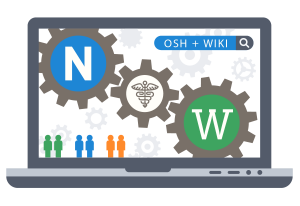The Powerhouse: Students’ contributions towards expanding and improving occupational safety and health content in Wikipedia
Posted on by
The history and motivation behind the efforts NIOSH is putting into expanding and improving occupational safety and health in Wikipedia was discussed in earlier NIOSH Science Blogs (May 19,2015 and July 25, 2018) and thru the NIOSH January 2017 eNews. Here we will focus on the partnerships created between NIOSH and university graduate and training programs since 2016. In 2015, the NIOSH authors of this Blog reached out to university professors to encourage adoption of the platform developed by the Wiki Education Foundation to train students (or interns) in Wikipedia editing and to add or develop evidence-based content to Wikipedia articles as a class assignment.
A NIOSH researcher who teaches a graduate course in occupational epidemiology at the University of Cincinnati conducted an initial pilot project in the spring of 2016. The course syllabus, assignment, and student topics, including before and after versions of the pages, are available through this link. The students did more than what was assigned to them, from not only improving existing Wikipedia pages, to creating five Wikipedia pages (in English and Spanish) that did not exist before, like the one on the health effects of coal ash and one on asma ocupacional (occupational asthma in Spanish). In total, the pages they edited were viewed 2.27 million times, during the time period tracked by Wiki Education (for approximately up to a month following the class’ conclusion). The feedback received from both faculty and students was very positive. A common response among students is that they enjoyed writing “to be read” and not just “to be graded” (see related article). Overall, everyone involved viewed the pilot project as a success. From the instructor’s point of view, the use of the WikiEducation platform did not add extra time in preparation for the class and some indicated that it ended up saving them time. The Wiki Education platform is user friendly, with online training and support offered by Wiki Education. Instructors can continue to focus on the subject matter of the course, while students and interns are able to get support from Wiki Education to address the mechanics of editing Wikipedia. NIOSH researchers and Wikipedians-in-Residence offered an extra layer of support pertinent to articles on occupational safety and health, including suggested topics.
From that initial success with the University of Cincinnati, we used the Wiki Education platform in the summer of 2016 to track contributions from NIOSH summer interns and staff in a training exercise. Since then, the platform was used again in 2018 in the same University of Cincinnati Occupational Epidemiology course, as well as in a separate Environmental Public Health course. It was also used for the University of Northern Colorado’s Hearing Loss Prevention courses in 2016 and 2017, the University of Nebraska’s Hearing Conservation courses in 2017 and 2018, and by Harvard University, Harvard T.H. Chan School of Public Health’s Introduction to the Work Environment course and the upcoming 2018 course. Please visit these links above to appreciate the extent and reach of the contributions the students in these courses made.
While there are many avenues for researchers and academics to publish scientific writing professionally, despite our busy schedules, there are many reasons to take time to expand the scientific content into Wikipedia. These include the ability to 1) provide a public service, 2) contribute solid, verifiable knowledge about occupational health to the public and 3) eliminate misinformation. Those who are interested in science communication will benefit from having access to metrics on the number of page views and the interaction with other Wikipedia editors. It is also rewarding to have outcome metrics reporting the reach of these efforts. By using the Wiki Education platform when teaching, instructors are also helping students to improve their science communication skills and digital literacy, tools which will equip them for their future careers.
In the health arena, the scrutiny given to new edits to Wikipedia is even greater than that given to other areas, probably because of the dedication of editors who are health professionals and collaborative ventures with scientific associations and agencies (Shafee et al., 2017). Furthermore, the transparency of the actions and editorial processes on Wikipedia make it easier for researchers to address any concerns they might have over participation.
The breadth and accuracy of the Wikipedia coverage of the sciences varies widely, and we see this as a chance to make significant contributions to the occupational safety and health content. Let us know if you have any questions or want to join this effort in some capacity by sending a comment to this Blog.
Thais C. Morata, research audiologist at NIOSH and the Coordinator of the National Occupational Research Agenda Manufacturing Sector Council
Max Lum, Senior Advisor for eCommunication and Research Translation in the NIOSH Office of the Director
John Sadowski, NIOSH Wikipedian-in-Residence
Tania Carreόn-Valencia, research epidemiologist and Associate Director for Science of the NIOSH World Trade Center Health Program, and Volunteer Associate Professor in Environmental Health at the University of Cincinnati
Deanna Meinke, Professor, University of Northern Colorado
Emily Wakefield, Lecturer, University of Nebraska
Diana Ceballos, Research Scientists and Instructor, Harvard T.H. Chan School of Public Health
Mary Beth Genter, Professor in the Department of Environmental Health at the University of Cincinnati
We would like to thank James Heilman, Wikipedian, and Helaine Blumenthal, Ian Ramjohn, and others at the Wiki Education Foundation for their input and guidance.
Posted on by

